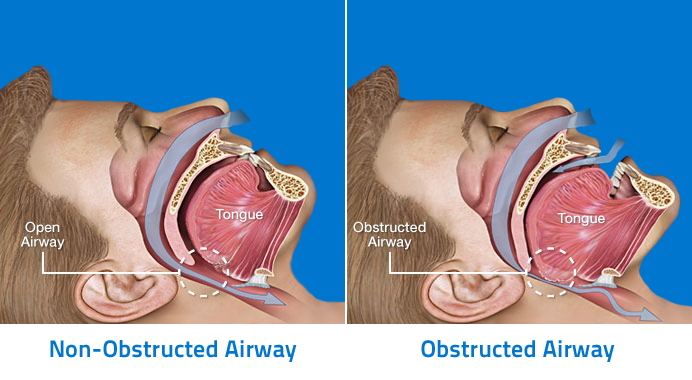Sleep apnea is a condition when you temporarily stop breathing while you’re sleeping or the breaths that you take are shallow. The temporary breathing can last from a few seconds and go on for a few minutes, and can be accompanied by loud snorting or choking. These breathing interruptions can occur as many as 30 times within a 60 minute time span. Afterwards, you would breathe normal again. This condition interrupts you from getting a good night’s sleep which leads you to be groggy and tired.
This condition is not easily diagnosed and not always detected during a regular exam with your physician. Because it happens while you are sleeping, the way that you may find out about it is if someone notices you have an unusual sleeping pattern. Even then, they probably won’t know that you may have sleep apnea. Millions of adults are suffering from sleep apnea and don’t know it. The majority of them are overweight or obese. Men suffer from this condition more than women. The older a person is, the more likely they can inherit this condition. With women, they can develop sleep apnea in the post-menopausal stage of their life. More minority groups, such as African-Americans, Hispanics and Pacific Islanders develop sleep apnea more than other ethnic groups. It can also be inherited from a family member. If you have small airways in your throat, mouth or nose, you are more likely to have this condition.
You can also be at risk for sleep apnea if you:
- Smoke
- Have high blood pressure
- Potential for having a stroke
- Heart Failure
Signs And Symptoms
The most obvious sign of sleep apnea is snoring that is loud and consistent. When you sleep on your back, the snoring gets louder. If you sleep on your side, the snoring may not be as loud. You may or may not snore every night. Eventually, the snoring may increase and it may get louder as you sleep. Since you’re sleep while you’re snoring or gasping, you may not know that you’re having breathing issues. Others will see the signs before you and will let you know if it becomes a pattern. Be aware that just because you may be a chronic snorer, it doesn’t mean that you have sleep apnea. If you are fighting sleep during the day, that could be a sign that you have sleep apnea. If you’re not engaged in any activity, you may end up falling asleep very quickly. If this happens while you’re at work or you’re driving, the chances are greater that you may end up in a work-related accident or an accident while you’re driving.
There are other signs and symptoms that people may not associate with sleep apnea. They are:
- Headaches in the morning
- Frequent urination in the evening or night hours
- Moody or experiencing a change in your personality
- Can’t concentrate, focus or loss of memory
- Dry throat in the morning as you wake up
The muscles in your throat are used to keep the airway open so that you can get air into your lungs. However, when you’re sleeping, your throat muscles are relaxed. This means that your airway can be blocked and air won’t get into your lungs. Low oxygen levels cause you not to be able to get a good night’s sleep. The muscles in the upper airway get tight and your windpipe is open. You are able to breathe normal again, until you start snorting or choking. Along with the frequent low levels of oxygen and less hours of sleep, your stress hormones are released. This can cause you to have high blood pressure, a stroke, heart attack and abnormal heartbeats. The stress hormones can also cause you to have heart failure. If your condition is not treated, you could be at a greater risk of obesity and diabetes.

Treatments For Sleep Apnea
The purpose of treating obstructive sleep apnea is to allow the patient to be able to breathe regularly as they sleep. The treatment also helps to get relief from snoring loudly and being chronically sleepy during the day. Treatment of sleep apnea also helps to reduce medical problems, such as heart disease, diabetes, high blood pressure and other medical conditions.
There are different types of treatments to use for sleep apnea. Here are some of the more common ones:
- Lifestyle changes (losing weight, quit smoking, changing your sleeping position)
- CPAP
- Mouthpiece or oral appliance
- Surgery
- Therapies
With treatment, you can get more sleep and get rid of being tired and sleepy during the daytime. Your overall health will improve along with you being happier that you are able to get a solid night’s sleep without being interrupted (not to mention, your partner, who may be up all night because of disturbances).










